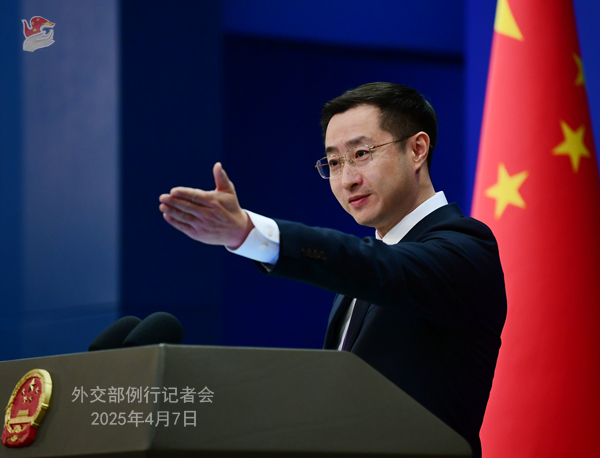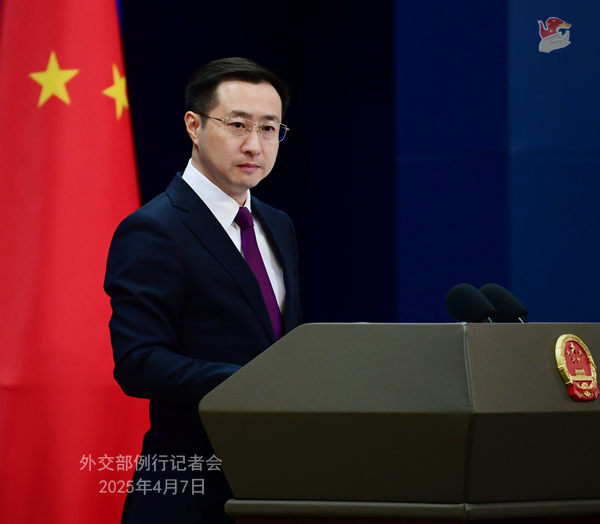
CCTV: The U.S. recently announced tariff hikes on all trading partners, covering over 180 countries and regions in the world, including some vulnerable economies designated as the least developed countries by the UN. Comments say that the high tariffs will deal an unprecedented heavy blow to poor countries that have simple economic structure and are highly reliant on export. Spokesman for the UN Secretary-General Stéphane Dujarric warned that the trade war will adversely affect implementation of Sustainable Development Goals, and the concern right now is with the most vulnerable countries, which are the least equipped to deal with the current situation. WTO Director-General Ngozi Okonjo-Iweala noted that the U.S. tariffs could lead to an overall contraction of around 1 percent in global merchandise trade volumes this year and will have substantial implications for global trade and economic growth prospects. What is your comment?
Lin Jian: The U.S. hegemonic move in the name of “reciprocity” serves its selfish interests at the expense of other countries’ legitimate interests and puts “America first” over international rules. This is a typical move of unilateralism, protectionism and economic bullying. China has issued the Chinese Government’s Position on Opposing U.S. Abuse of Tariffs to express our serious and just attitude.
The U.S. abuse of tariffs deprives countries, especially Global South countries, of their right to development. Analysis of WTO data shows that in light of the uneven economic development and strengths, the U.S. tariff hikes will further widen the wealth gap among countries and less developed countries will feel a heavier blow. This gravely hurts the effort for realizing the UN 2030 Agenda for Sustainable Development. The U.S. tariffs with differentiated rates violate the WTO principle of non-discrimination, severely disrupt the international trade order and the security and stability of the global industrial and supply chains, severely undermine the multilateral trading system, severely hinder global economic recovery, and will certainly be rejected by the international community.
Open cooperation represents the trend of history and mutual benefit is what the people want. Development is a universal right of all countries, not an exclusive privilege of a few. Countries need to uphold the principles of extensive consultation, joint contribution and shared benefit, remain committed to true multilateralism, jointly oppose unilateralism and protectionism of all forms, safeguard the international order with the UN at its core, and uphold the multilateral trading system with the WTO at its center.
Yonhap News Agency: The constitutional court of the ROK decided on April 4 to uphold President Yoon Suk Yeol’s impeachment. How does China view the decision? How do you think the decision will affect ROK-China relations?
Lin Jian: We noted the ruling and relevant decision. This is the domestic affair of the ROK. We hope the ROK will advance its domestic political agenda in an orderly manner and keep the political situation and society stable.
China and the ROK will always be close neighbors and we are inseparable cooperation partners. China’s policy on the ROK maintains continuity, stability and certainty. We stand ready to work with the ROK to cherish the commitment made when establishing diplomatic ties, uphold good neighborliness and the friendly ties, work for mutual benefit, and promote the sound and steady development of the strategic cooperative partnership.
Global Times: According to reports, Chinese experts conducted another independent sample collection for the nuclear-contaminated water from the Fukushima Daiichi nuclear power station in February, and the test result has been obtained. Could you share more information?
Lin Jian: According to what we learned from relevant authorities, Chinese research institutions have completed tests and analysis of China’s independent sampling in February this year, including that of seawater and marine life in the nearby waters of the Fukushima Daiichi nuclear power station. No abnormality was seen in the activity concentration of radionuclides including tritium, caesium-134, caesium-137 and strontium-90. Later on, these relevant test data will be submitted to the IAEA for information gathering and release.
Like we stressed repeatedly, no abnormality in one single test doesn’t mean any test result will be normal in the future. During the recent China-Japan High-Level Economic Dialogue, the Japanese side reiterated that it accepts long-term international monitoring and independent sampling and monitoring by China and confirmed that the above-mentioned monitoring activities will be carried out on a continuous basis. China’s opposition to Japan’s discharge of the nuclear-contaminated water has never changed. We will continue to work with the international community and professional agencies including the IAEA to urge Japan to honor its commitments and ensure that the discharge of Fukushima nuclear-contaminated water always remains under international oversight.
CNBC: We noticed that the latest statement from China on the U.S. tariffs did not mention much about negotiations and we were wondering under what conditions would China be able to negotiate with the U.S. and will Chinese and U.S. presidents speak soon to do so or has it become more challenging?
Lin Jian: On negotiations, I’d refer you to competent authorities. We have stressed more than once that pressuring or threatening China is not a right way to engage with us. China will firmly safeguard its legitimate rights and interests.
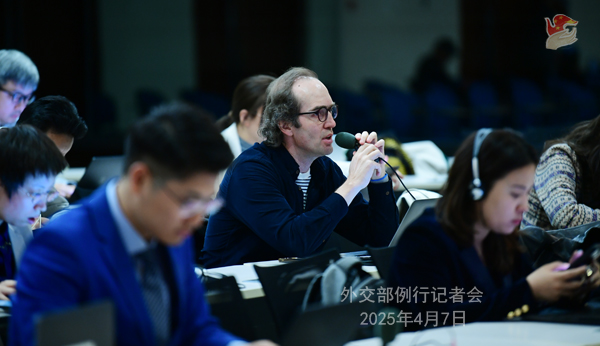
Anadolu Agency: I want to follow up with question about U.S. tariffs. Experts noticed that the formula that was used by the Trump administration to calculate the tariff rates was simply dividing U.S. trade deficit to that country by a country’s exports to the U.S. So it wasn’t related with the real tariff rates at all. China isn’t actually deploying 67 percent tariffs to the U.S. They call it effective tariff rates, claiming currency manipulation and other trade barriers are also added up in the calculation, while in fact not. What do you think about this method of calculation? So U.S. tariff policy, this new policy of the Trump administration, seems like an action against the logic of international trade for the past 40 years and a trend of economic globalization. So do you think this is a declaration of a new global economic order by the U.S.? Does China plan any new action or cooperation that will minimize or nullify the effects of these tariff hikes by U.S.?
Lin Jian: I think what you said represents the right view and position of the international community and people with vision. The Chinese government has stated its just position on the U.S. abuse of tariffs. The U.S.’s tariff hikes on all trading partners, including China, under various pretexts seriously infringe upon the legitimate rights and interests of countries, violate WTO rules, undermine the rules-based multilateral trading system and destabilize the global economic order. The Chinese government strongly deplores and firmly rejects this. What the U.S. has done is a typical move of unilateralism, protectionism and economic bullying. It will hurt the U.S. itself as well as others.
The vast majority of countries in the world that uphold fairness and justice will choose to stand on the right side of history, make choices that are in line with their own interests, and jointly oppose all forms of unilateralism, protectionism, and economic bullying. China is also willing to work with all parties to uphold true multilateralism, jointly safeguard the multilateral trading system with the WTO at its core, and defend international fairness and justice.
Reuters: This is about Kenya’s debt restructuring. Kenya’s finance ministry released a statement last week which has since been withdrawn, saying China had said it would be willing to facilitate a debt restructuring for Kenya after its finance minister visited Beijing. Could the Foreign Ministry confirm this?
Lin Jian: Over the years, China’s investment and financing cooperation with Kenya has boosted Kenya’s socioeconomic development and improved people’s livelihood. China stands to continue to promote development cooperation with Kenya and other African countries based on the principle of mutual benefit.
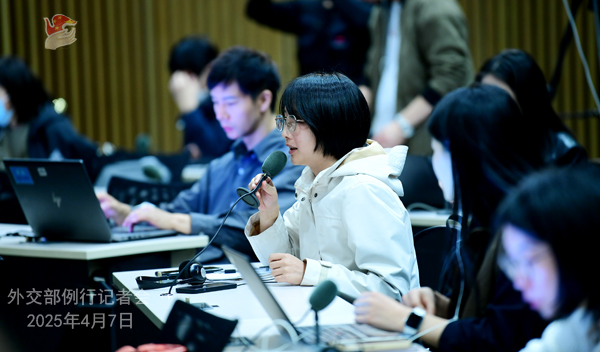
AFP: The National Security Council of the Philippines said over the weekend that the supposed confessions of three Filipinos arrested by China for alleged espionage appeared to have been scripted and they urged Beijing to respect their rights. Does the Foreign Ministry have any comment?
Lin Jian: Competent authorities have released detailed information on the espionage activities conducted by the Philippine nationals in China. China’s judicial and relevant authorities handle the case based on facts and in strict accordance with the law, and will protect the lawful rights and interests of the personnel involved.
Recently the Philippines concocted a series of so-called Chinese spy cases. This is a typical act of stigmatization and politicization based on presumption of guilt in the absence of clear evidence. We firmly oppose that, and have lodged protests against the Philippines more than once. China urges the Philippines to stop shadow-chasing and making false accusations, handle the cases concerning Chinese citizens in a just manner and in accordance with law, and effectively protect the lawful rights and interests of Chinese citizens in the Philippines.
NHK: A follow-up on the Fukushima nuclear-contaminated water. As we understand, when meeting with Japan-China friendship groups in Tokyo in March, Director Wang Yi suggested that if no problem turns up in this latest test result, it will likely lead to progress on this issue. Is China willing to speed up talks with Japan on the resumption of imports of Japanese aquatic products?
Lin Jian: The Chinese government always puts people first and firmly safeguards the food safety of our people. The Japanese made a clear commitment of accepting long-term international monitoring and independent sampling and monitoring by China. On the basis of Japan’s fulfillment of its commitments and no abnormality in the test results, on March 12 as scheduled, China’s General Administration of Customs held a technical exchange with the Japanese side in Beijing on the safety of Japanese aquatic products.
Bloomberg: President Donald Trump has said that China’s objections to the new tariffs stalled the deal to sell up TikTok and keep it operating in the U.S. Did China’s objections prevent a deal from being concluded recently and would the Ministry like to comment any further on the TikTok issue?
Lin Jian: We have stated our principled position on TikTok on multiple occasions. China will handle relevant issue in accordance with China’s laws and regulations.
The U.S. needs to provide an open, fair, just and non-discriminatory environment for Chinese businesses in the country.
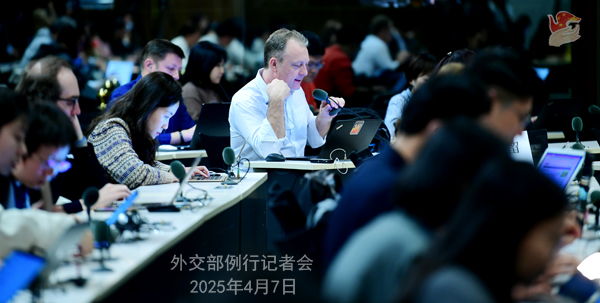
AFP: Australian Prime Minister Anthony Albanese and his election rival Peter Dutton have both called for the sale of the port of Darwin which is controlled by a Chinese firm to remove it from Chinese ownership. Does the Foreign Ministry have any comment on that?
Lin Jian: We urge the Australian side to provide a fair, non-discriminatory and predictable business environment for Chinese enterprises investing and operating in Australia, and refrain from overstretching the concept of national security or politicizing normal business cooperation.
Ukrinform News Agency: Last Friday, Russian troops fired a ballistic missile with cluster munitions at Ukrainian city Kryvyi Rih. Twenty people were killed, and almost 100 others were injured. Russian military continues to attack Ukrainian cities, including the capital Kyiv city, despite Moscow’s statements about its readiness for peace talks and a ceasefire. Can the Ministry of Foreign Affairs comment on this situation?
Lin Jian: China’s position on the Ukraine crisis is consistent and clear. Dialogue and negotiation is the only viable way out the crisis.
Bloomberg: A delegation led by Taiwanese national security adviser Joseph Wu was just in Washington to meet with the Trump administration for a special channel meeting. Would the Foreign Ministry like to comment?
Lin Jian: There is but one China in the world, and Taiwan is an inalienable part of China’s territory. China firmly opposes any official interaction between the U.S. and Taiwan in any form. This position is consistent and clear. We made protest to the U.S. side and call on the U.S. to abide by the one-China principle and the three China-U.S. joint communiqués, stop any official interaction with China’s Taiwan region, stop meddling in the Taiwan question, and stop creating factors that fuel tensions in the Taiwan Strait. The Lai Ching-te authorities’ attempts to solicit U.S. support for “Taiwan independence” will lead nowhere.
Reuters: Ethiopia has reached an agreement in principle with its official creditors on restructuring US$8.4 billion of debt. As China is the biggest bilateral creditor, does that mean China has agreed to take a haircut or does the agreement constitute an extension of maturities rather than write-downs of the principal amount?
Lin Jian: I’d refer you to competent authorities for anything specific. Let me stress that China and Ethiopia are all-weather strategic partners. China maintains close communication with Ethiopia on the debt issue and will continue to play its role as the co-chair of the creditor committee for Ethiopia under the Common Framework, facilitate the appropriate and ultimate settlement of Ethiopia’s multilateral debt, and help the country ease its fiscal distress.
